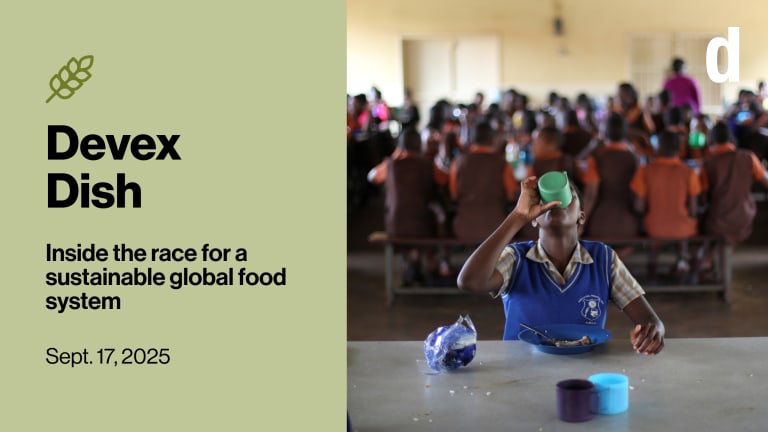
Food security is not just about feeding the hungry. It’s about having adequate access to nutritious foods and producing them while safeguarding the planet.
Innovative solutions to advance food security abound but adoption can be slow. That’s due in part to a lack of sufficient extension services for farmers that clarify the relationship between climate change, food security and biodiversity.
“Part of the problem with extension programs can be traced to poor governance or a too-narrow focus on specific — often foreign — interventions; in areas where extension programs are privatized, particular seeds or pesticides are often pushed for profit with only a secondary focus on the design of interventions that best serve people at the local level,” wrote Catherine Cheney for Feeding Development, a global conversation to reimagine solutions for a food-secure future from seed and soil to a healthy meal.
Devex readers have already chimed in en masse with their thoughts on how to feed Earth’s growing population.
A reader named James listed several challenges: trade barriers, skewed resource allocation and misplaced priorities by the government. He also noted that most farmers, due to their skill levels, don’t understand well the relationship between crop nutrition, disease occurrence and the use of integrated pest management, an environment-friendly form of pest control.
See more #FeedingDev articles:
• Global food security: Why it affects us all
• We can prevent another food price crisis
• Let's rise to the challenge of global food security
Because IPM means reducing the use of pesticides, chemical companies are reluctant to carry out research on the practice, Ian Toal observed. He urged governments to fill that void, arguing that it’s their mission to help farmers and “not specifically to sell a product.”
The key to changing agricultural practices, according to Diederik van Groen, is not so much a matter of new knowledge but rather a matter of political will.
“Indeed, no single actor can do this alone; to foster new ecologically and economically sound food value chains, we need the political will to cooperate,” he said.
For Counter2u, misguided social activism is derailing progress in food security.
“Environmentalists preaching against genetically modified seeds and judiciously applied insecticides … have killed millions with their lies,” the reader suggested.
What do you think? Chime in by leaving a comment below.
Want to learn more? Check out Feeding Development's campaign site and tweet us using #FeedingDev.
Feeding Development is an online conversation hosted by Devex in partnership with ACDI/VOCA, Chemonics, Fintrac, GAIN, Nestlé and Tetra Tech to reimagine solutions for a food-secure future from seed and soil to a healthy meal.








